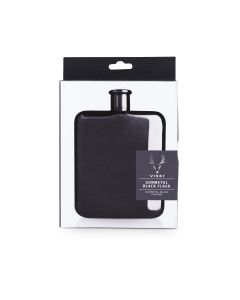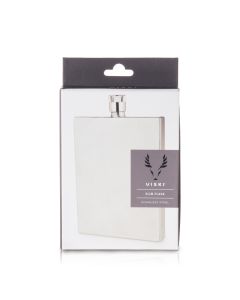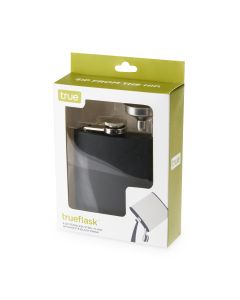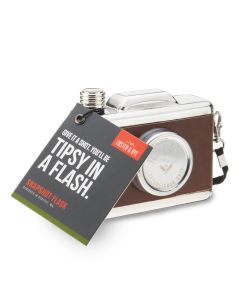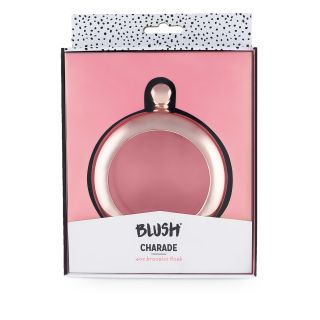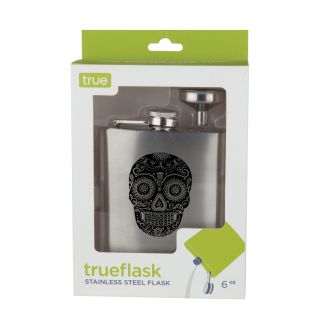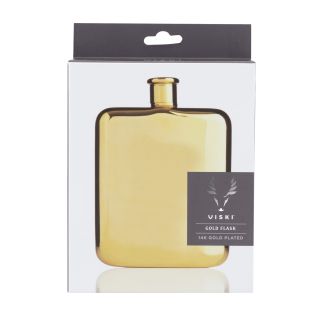A liquor flask is more than just a vessel; it's a companion for many aficionados of fine spirits, whether you're tailgating at a sports event, enjoying a scenic hike, or sharing moments with friends around a campfire. Keeping your liquor flask clean and well-maintained is crucial for ensuring that every sip is as enjoyable as the first. In this comprehensive guide, we’ll delve into the intricacies of maintaining and cleaning a flask, providing you with all the necessary information to keep it in top-notch condition.
Why is Cleaning Your Liquor Flask Important?
Before we delve and find out how to clean a liquor flask from inside and outside let us know the importance of cleaning. Cleaning your stainless steel alcohol flask is vital for several reasons:
Taste Preservation: Over time, residues from previous drinks can accumulate inside your flask. This residue can interact with new liquids, altering their flavors. A well-cleaned flask ensures that each drink retains its original taste, whether you’re pouring in whiskey, rum, or a refreshing cocktail.
Hygiene: Like any drinking container, a flask can harbor bacteria, mold, and other unwanted contaminants if not cleaned regularly. This is especially true for alcohol pocket flasks that may not be used frequently. Proper cleaning helps safeguard your health and the health of those sharing drinks with you.
Longevity: Regular cleaning and maintenance can significantly extend the life of your flask. Neglecting to clean it can lead to rust, discoloration, and a breakdown of the materials, particularly in flasks made from lower-quality metals.
Aesthetic Appeal: A clean flask is a polished accessory that reflects your taste and style. Whether it’s a gift or your personal item, a well-maintained flask is always more appealing.
Avoiding Costly Repairs or Replacements: Flasks that aren’t cared for may develop leaks or other issues that can be costly to repair or may necessitate a complete replacement.
Materials Required to Clean a Liquor Flask
To properly clean your whiskey pocket flask, you’ll need to gather a few essential materials:
Warm Water: Helps dissolve residues and makes cleaning easier.
Mild Dish Soap: A gentle soap that won’t damage the finish of your flask.
Baking Soda: This versatile cleaner is excellent for removing stubborn stains and neutralizing odors.
Bottle Brush: A long-bristled brush will help you access hard-to-reach areas inside the flask.
Clean Cloth: For drying and polishing the exterior after cleaning.
Vinegar: A natural disinfectant that can help remove odors and stains.
Flask Cleaner: Some manufacturers offer specially formulated flask cleaners that can simplify the cleaning process.
How to Clean Your Liquor Flask from Inside
Cleaning the interior of your stainless steel hip flask is paramount to ensure its freshness and taste. Here’s how to wash flask from inside:
Rinse: Start by rinsing your flask with warm water to remove any leftover liquid. This helps loosen any deposits or residues.
Soak: Fill the flask halfway with warm water, then add a few drops of mild dish soap. Let it soak for 10-15 minutes. This soaking process is critical for breaking down stubborn residues.
Scrub: After soaking, use a bottle brush to gently scrub the interior. Pay special attention to the bottom and corners where buildup is most likely to occur. Knowing how to clean a flask inside can make this task much more manageable.
Baking Soda Paste: For any stubborn stains, make a paste using baking soda and a small amount of water. Apply this paste to the stained areas, allowing it to sit for a few minutes before scrubbing again with the bottle brush.
Rinse Thoroughly: Rinse the flask with warm water multiple times to ensure all soap and baking soda are removed. A thorough rinse is essential to avoid any residual taste or odor.
Vinegar Rinse: To further deodorize and disinfect, fill the flask with a mixture of equal parts vinegar and water. Let it sit for about 30 minutes, then rinse thoroughly again.
Final Rinse: Complete the cleaning process with a final rinse of warm water, ensuring that no cleaning agents remain.
How to Clean Your Liquor Flask from Outside
While the interior cleaning is vital, the exterior of your alcohol pocket flask also needs attention to maintain its appearance and functionality. Here’s how to wash flask from outside:
Wipe Down: Use a clean cloth dampened with warm, soapy water to wipe down the exterior of the flask. This removes fingerprints, smudges, and dust that accumulate from regular handling.
Stubborn Stains: For tougher stains or marks, use a soft sponge with mild dish soap. Avoid abrasive materials that could scratch the surface, as scratches can lead to corrosion over time.
Dry Immediately: After cleaning, dry the flask immediately with a clean, dry cloth. This step helps prevent water spots and maintains the shine of the flask.
Polish: If desired, you can use a metal polish specifically designed for stainless steel to restore the flask’s shine and add a protective layer against tarnishing.
Read on: Innovative Top Sneaky Flasks for Every Occasion: Enjoy Your Favorite Drinks Anywhere
How to Dry and Store Your Flask After Cleaning
Proper drying and storage are key factors in maintaining your best hip flask:
Air Dry: After washing, leave the flask open to air dry completely. This step prevents moisture buildup inside, which can lead to mold and odors.
Store Upright: Once completely dry, store your flask upright to avoid any residual moisture accumulating at the bottom.
Avoid Direct Sunlight: Store your flask away from direct sunlight, as prolonged exposure can warp the material or alter its finish.
Use a Flask Sleeve: Consider using a protective sleeve or case to shield your flask from scratches and damage when stored with other items.
Looking to elevate your commercial bar experience? At BistrotoRestro, discover the finest collection of premium liquor accessories and barware sets. From sleek cocktail shakers to elegant glassware, our essentials are designed to enhance your service—all at unbeatable prices.
Liquor Flask Maintenance Tips
Maintaining your stainless steel alcohol flask goes beyond just cleaning. Here are some additional tips to keep your flask in prime condition:
Regular Cleaning: Make it a habit to clean your flask after each use. If you don’t use it frequently, try to clean it at least once a month.
Choose Your Liquor Wisely: Be mindful of what you store in your flask. High-proof spirits can accelerate the corrosion of certain materials, so it's best to use lower-proof options if you're unsure about the flask's composition.
Inspect Seals: Regularly check the seals and closures to ensure they are functioning properly. A tight seal prevents leaks and keeps your contents secure.
Avoid Leaving Liquid for Long: Try not to leave liquid in your flask for extended periods, as this can lead to unwanted flavors and odors. If you know you won't be using it for a while, it’s best to empty it.
Follow Hydro Flask Care Instructions: If your flask comes from a specific brand, check for any special care instructions that may apply. Different materials may require different cleaning methods.
Use Specialized Products: When applicable, use flask cleaners that are designed to break down tough residues and disinfect the interior without damaging the flask.
Checkout: Bartending Essential Glossary Guide
How to Remove Stubborn Odors
Sometimes, even after cleaning, your alcohol pocket flask might retain an unpleasant smell. Here are some effective methods to eliminate stubborn odors:
Baking Soda Treatment: Fill the flask with warm water and a generous amount of baking soda. Seal the flask and shake it gently. Let it sit for several hours or overnight before rinsing thoroughly.
Vinegar and Water: As previously mentioned, a vinegar rinse can help remove odors. Mix equal parts vinegar and water, fill the flask, let it sit, and then rinse well.
Coffee Grounds: If your flask can handle it, filling it with dry coffee grounds can help absorb odors. Leave them in the flask for a day or two, then rinse and clean as usual.
Activated Charcoal: This natural odor absorber can be placed inside your flask and left overnight. Afterward, rinse the flask thoroughly.
Knowing how to clean a liquor flask properly is essential for any flask owner who wants to preserve the integrity and flavor of their drinks. With the right materials and techniques, you can ensure that your stainless steel hip flask stays clean and functional. Regular maintenance and care not only extend the life of your flask but also enhance your drinking experience, making every sip a pleasure.
Incorporating these cleaning and maintenance tips into your routine will ensure that your flask remains a cherished companion for years to come. Whether you’re enjoying your favorite whiskey or sharing a toast with friends, a clean and well-maintained flask will enhance the experience, keeping the focus where it belongs—on the moments that matter. Cheers!
FAQs
Can you put water in a hip flask?
Yes, you can put water in a hip flask, but it's best to avoid liquids that may leave strong odors or flavors.
How often should you clean your liquor flask?
It’s best to clean your flask after each use. If you don’t use it often, aim for at least once a month to maintain its hygiene and freshness.
What happens if you don't clean your flask?
Neglecting to washing flask can lead to bacteria growth, unpleasant odors, and flavors that compromise your drinking experience. Over time, this neglect can also cause permanent damage to the flask.
How long is liquor good in a flask?
Generally, liquor stored in a flask is best consumed within a week. However, some spirits, particularly those high in alcohol content, may last longer. Always check for changes in smell or taste before drinking.
Can I put hot liquids in my flask?
While many stainless steel flasks can handle hot liquids, it's essential to check the manufacturer's guidelines. Some flasks are designed specifically for cold beverages.


